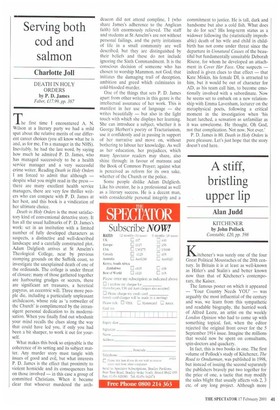Serving both cod and salmon
Charlotte Jo11
DEATH IN HOLY ORDERS by P. D. James Faber, £17.99, pp. 387 he first time I encountered A. N. Wilson at a literary party we had a mild spat about the relative merits of our different career choices (you all know what he is and, as for me, I'm a manager in the NHS). Inevitably, he had the last word, by saying how much he admired P. D. James, who has managed successively to be a health service manager and a very successful crime writer. Reading Death in Holy Orders I am forced to admit that although — despite what you might read in the press — there are many excellent health service managers, there are very few thriller writers who can compete with P. D. James at her best, and this book is a vindication of her ultimate choice.
Death in Holy Orders is the most satisfactory kind of conventional detective story. It has all the usual hallmarks of P. D. James's work: set in an institution with a limited number of fully developed characters as suspects, a distinctive and well-described landscape and a carefully constructed plot. Adam Dalgliesh arrives at St Anselm's Theological College, near by previous stomping grounds on the Suffolk coast, to investigate the unexplained death of one of the ordinands. The college is under threat of closure: many of those gathered together are harbouring grudges or secrets, there are significant art treasures, a heretical papyrus, an eccentric will. Three more people die, including a particularly unpleasant archdeacon, whose role as 'a rottweiler of the Church' is complimented by the intransigent personal dedication to its modernisation. When you finally find out whodunit your mind recalls the clues along the way that could have led you, if only you had been a bit sharper, to work it out for yourself.
What makes this book so enjoyable is the coherence of its setting and its subject matter. Any murder story must tangle with issues of good and evil, but what interests P. D. James is the effect that proximity to violent homicide and its consequences has on those involved — in this case a group of committed Christians. When it became clear that whoever murdered the arch
deacon did not attend compline, I (who share James's adherence to the Anglican faith) felt enormously relieved. The staff and students at St Anselm's are not without personal failings, and the petty irritations of life in a small community are well described, but they are distinguished by their beliefs and these do not include ignoring the Sixth Commandment. It is the conscious decision of someone who has chosen to worship Mammon. not God, that initiates the damaging trail of deception, ambition and greed which culminates in cold-blooded murder.
One of the things that sets P. D. James apart from other writers in this genre is the intellectual assurance of her work. This is manifest in her use of language — she writes beautifully — but also in the light touch with which she displays her learning. She can introduce a subject, whether it is George Herbert's poetry or Tractarianism, use it confidently and in passing in support of her narrative and move on, without bothering to labour her knowledge. As well as her education, her prejudices, which many Spectator readers may share, also shine through: in favour of matrons and the Book of Common Prayer; against what is perceived as reform for its own sake, whether of the Church or the police.
Some people dislike Adam Dalgliesh. Like his creator, he is a professional as well as a literary success. He is a decent man, with considerable personal integrity and a
commitment to justice. He is tall, dark and handsome but also a cold fish. What does he do for sex? His long-term status as a widower following the (statistically improbable) death of his wife and child in childbirth has not come under threat since the departure in Unnatural Causes of the beautiful but fundamentally unsuitable Deborah Riscoe, for whom he developed an attachment in Cover Her Face. One suspects — indeed is given clues to that effect — that Kate Miskin, his female DI, is attracted to him, but it would be out of character for AD, as his team call him, to become emotionally involved with a subordinate. Now he seems set to embark on a new relationship with Emma Lavenham, lecturer on the metaphysical poets, following a critical moment in the investigation when 'his heart lurched, a sensation as unfamiliar as it was unwelcome. He thought, Oh God, not that complication. Not now. Not ever.'
P. D. James is 80. Death in Holy Orders is pure pleasure. Let's just hope that the story doesn't end here.


































































 Previous page
Previous page